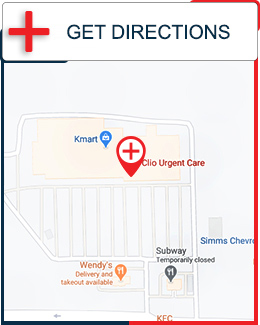Home » What Causes Lower Abdominal Pain in Females Clio MI
You cannot copy content of this website, your IP is being recorded
What Causes Lower Abdominal Pain in Females?
Lower abdominal pain in females can be caused by various issues, from everyday menstrual cramps to more serious conditions like endometriosis or an ovarian cyst. At Clio Urgent Care, our healthcare professionals can perform the necessary exams and tests to determine the exact cause, ensuring you receive the correct diagnosis and treatment to prevent potential complications. For more information, please contact us or simply walk in! You can also schedule your appointment online. We are conveniently located at 4272 W. Vienna Road Clio, MI 48420.

Additional Services We Offer

Additional Services We Offer







